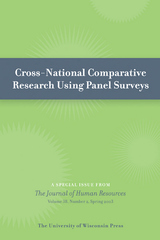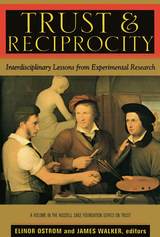3 books by Walker, James

Cross-National Comparative Research Using Panel Surveys
Special Issue of Journal of Human Resources 38:2 (Spring 2003)
Edited by James P. Smith, Frank Stafford, and James R. Walker
University of Wisconsin Press, 2010
This special issue revises and expands on presentations given at a conference on comparative research using international panel surveys held in Ann Arbor, Michigan. Five of the articles explicitly or implicitly examine international differences in savings behavior and wealth accumulation. The final two articles use international comparisons to assess the status of young children.
[more]

Stories about Posts
Vedic Variations around the Hindu Goddess
Madeleine Biardeau
University of Chicago Press, 2004
Stories about Posts is the magnum opus of Madeleine Biardeau, one of the most influential Indologists of the twentieth century. Nearly twenty years in the making, it connects her varied studies on the Sanskrit epics, the Hindu Goddess, Vedic sacrifice, rural India, and the interpretation of Hinduism.
After exploring several ethnographic facts that have escaped the notice of previous observers, Biardeau presents a variety of hunches, hypotheses, and insights building up to the provocative thesis of Stories about Posts: that the variations found in the contemporary cult of the Goddess—in both her royal and rural village aspects—reveal untraced regional histories of the Vedic sacrificial post, the yupa. Biardeau's work opens up new ways of thinking about Vedic sacrificial themes and elements as they recur in post-Vedic texts and iconographies. It also connects wayside stones in Maharashtra named after the buffalo to stones, posts, and people named after a so-called Buffalo King in Maharashtra, Andhra Pradesh, Karnataka, and Tamilnadu.
A work of magnificent scholarship and fieldwork, Stories about Posts, in ways no previous work has attempted, much less accomplished, unravels much of the mystery surrounding contemporary Hindu ritual by connecting it to the ancient Sanskrit epics. As such, it will fascinate students of Indology, religious studies, and anthropology for years to come.
After exploring several ethnographic facts that have escaped the notice of previous observers, Biardeau presents a variety of hunches, hypotheses, and insights building up to the provocative thesis of Stories about Posts: that the variations found in the contemporary cult of the Goddess—in both her royal and rural village aspects—reveal untraced regional histories of the Vedic sacrificial post, the yupa. Biardeau's work opens up new ways of thinking about Vedic sacrificial themes and elements as they recur in post-Vedic texts and iconographies. It also connects wayside stones in Maharashtra named after the buffalo to stones, posts, and people named after a so-called Buffalo King in Maharashtra, Andhra Pradesh, Karnataka, and Tamilnadu.
A work of magnificent scholarship and fieldwork, Stories about Posts, in ways no previous work has attempted, much less accomplished, unravels much of the mystery surrounding contemporary Hindu ritual by connecting it to the ancient Sanskrit epics. As such, it will fascinate students of Indology, religious studies, and anthropology for years to come.
[more]

Trust and Reciprocity
Interdisciplinary Lessons for Experimental Research
Elinor Ostrom
Russell Sage Foundation, 2003
Trust is essential to economic and social transactions of all kinds, from choosing a marriage partner, to taking a job, and even buying a used car. The benefits to be gained from such transactions originate in the willingness of individuals to take risks by placing trust in others to behave in cooperative and non-exploitative ways. But how do humans decide whether or not to trust someone? Using findings from evolutionary psychology, game theory, and laboratory experiments, Trust and Reciprocity examines the importance of reciprocal relationships in explaining the origins of trust and trustworthy behavior. In Part I, contributor Russell Hardin argues that before one can understand trust one must account for the conditions that make someone trustworthy. Elinor Ostrom discusses evidence that individuals achieve outcomes better than those predicted by models of game theory based on purely selfish motivations. In Part II, the book takes on the biological foundations of trust. Frans de Waal illustrates the deep evolutionary roots of trust and reciprocity with examples from the animal world, such as the way chimpanzees exchange social services like grooming and sharing. Other contributors look at the links between evolution, cognition, and behavior. Kevin McCabe examines how the human mind processes the complex commitments that reciprocal relationships require, summarizing brain imaging experiments that suggest the frontal lobe region is activated when humans try to cooperate with their fellow humans. Acknowledging the importance of game theory as a theoretical model for examining strategic relationships, in Part III the contributors tackle the question of how simple game theoretic models must be extended to explain behavior in situations involving trust and reciprocity. Reviewing a range of experimental studies, Karen Cook and Robin Cooper conclude that trust is dependent on the complex relationships between incentives and individual characteristics, and must be examined in light of the social contexts which promote or erode trust. As an example, Catherine Eckel and Rick Wilson explore how people's cues, such as facial expressions and body language, affect whether others will trust them. The divergent views in this volume are unified by the basic conviction that humans gain through the development of trusting relationships. Trust and Reciprocity advances our understanding of what makes people willing or unwilling to take the risks involved in building such relationships and why. A Volume in the Russell Sage Foundation Series on Trust
[more]
READERS
Browse our collection.
PUBLISHERS
See BiblioVault's publisher services.
STUDENT SERVICES
Files for college accessibility offices.
UChicago Accessibility Resources
home | accessibility | search | about | contact us
BiblioVault ® 2001 - 2024
The University of Chicago Press









